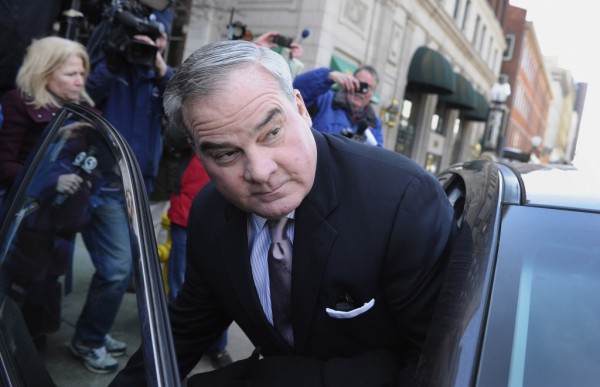
Former Connecticut Gov. John Rowland leaves federal court in New Haven, Wednesday, March 18, 2015. Rowland was sentenced to 30 months in prison for his role in a political consulting scheme on Wednesday, exactly one decade after he was ordered behind bars in an earlier scandal that forced him from office.
Former Gov. John G. Rowland is asking a court to grant him bond — delaying the start of his 30-month prison sentence — while his appeal of his latest felony conviction for campaign fraud is heard.
“There can be no dispute that Mr. Rowland does not pose a risk of flight or danger to the community,” Rowland’s appellate lawyer, Andrew Fish, wrote in a motion filed Friday.
The 23-page motion offers a road map of Rowland’s upcoming appeal of his September 2014 conviction for his role as a shadow operative on the failed 2012 congressional campaign of Republican Lisa Wilson-Foley.
Rowland, 57, is scheduled to report June 16 to federal prison in Otisville, N.Y., his second jail stint since a corruption scandal forced him to resign as governor in 2004 and cost him 10 months of freedom.
“His appeal will present substantial questions likely to result in reversal or a new trial,” Fish wrote.
A request for comment from federal prosecutors was left Monday with the Justice Department.
The youngest governor in Connecticut history who was elected to three terms, Rowland was found guilty of trying to hide his role as a political consultant to Wilson-Foley, who was sentenced last month to five months in federal prison.
Through a nursing home business owned by Wilson-Foley’s husband, Brian Foley, the couple funneled $35,000 in payments to Rowland. They did not want to be tainted by having Rowland on the campaign payroll, but admitted that the disgraced politician still had influence in the 5th Congressional District and Rowland’s home city of Waterbury. The district stretches from Danbury to the Farmington Valley and includes Litchfield County, Meriden and New Britain.
The basis of Rowland’s appeal is that prosecutors suppressed key evidence on the contract between Rowland and Foley, which Rowland’s lawyers have said was for legitimate work at the Apple Rehab nursing home chain.
“Under the campaign finance laws, it is not illegal to provide someone with a real job with the hope that they would then volunteer for a campaign,” Fish wrote. “Volunteer services are not a ‘contribution’ to a campaign for purposes of campaign finance law.”
Rowland’s request for bond will be decided by Janet Bond Arterton, the U.S. District Court judge who presided over his case in New Haven. His appeal will be heard by the Court of Appeals for the 2nd Circuit in New York City.